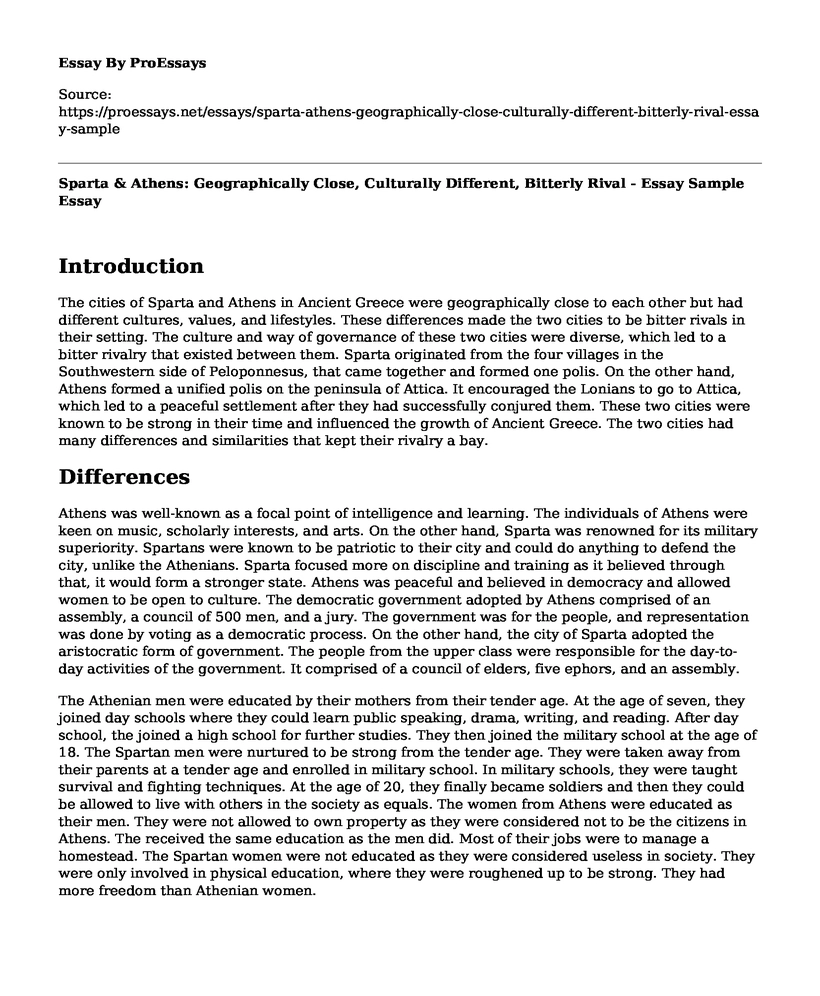Introduction
The cities of Sparta and Athens in Ancient Greece were geographically close to each other but had different cultures, values, and lifestyles. These differences made the two cities to be bitter rivals in their setting. The culture and way of governance of these two cities were diverse, which led to a bitter rivalry that existed between them. Sparta originated from the four villages in the Southwestern side of Peloponnesus, that came together and formed one polis. On the other hand, Athens formed a unified polis on the peninsula of Attica. It encouraged the Lonians to go to Attica, which led to a peaceful settlement after they had successfully conjured them. These two cities were known to be strong in their time and influenced the growth of Ancient Greece. The two cities had many differences and similarities that kept their rivalry a bay.
Differences
Athens was well-known as a focal point of intelligence and learning. The individuals of Athens were keen on music, scholarly interests, and arts. On the other hand, Sparta was renowned for its military superiority. Spartans were known to be patriotic to their city and could do anything to defend the city, unlike the Athenians. Sparta focused more on discipline and training as it believed through that, it would form a stronger state. Athens was peaceful and believed in democracy and allowed women to be open to culture. The democratic government adopted by Athens comprised of an assembly, a council of 500 men, and a jury. The government was for the people, and representation was done by voting as a democratic process. On the other hand, the city of Sparta adopted the aristocratic form of government. The people from the upper class were responsible for the day-to-day activities of the government. It comprised of a council of elders, five ephors, and an assembly.
The Athenian men were educated by their mothers from their tender age. At the age of seven, they joined day schools where they could learn public speaking, drama, writing, and reading. After day school, the joined a high school for further studies. They then joined the military school at the age of 18. The Spartan men were nurtured to be strong from the tender age. They were taken away from their parents at a tender age and enrolled in military school. In military schools, they were taught survival and fighting techniques. At the age of 20, they finally became soldiers and then they could be allowed to live with others in the society as equals. The women from Athens were educated as their men. They were not allowed to own property as they were considered not to be the citizens in Athens. The received the same education as the men did. Most of their jobs were to manage a homestead. The Spartan women were not educated as they were considered useless in society. They were only involved in physical education, where they were roughened up to be strong. They had more freedom than Athenian women.
Similarities
Citizens from both cities were both great thinkers and had great minds that aimed at success. They both participated in worshipping their gods as they believed in the supernatural powers that dictated their day-to-day lives. They both loved music, literature, politics, drama, beauty, and sports. Both had strong military that protected its citizens from the enemy. They also participated in farming and trading activities that provided them with food and other materials they wanted for their survival. Both cities had different types of governance, which dictated the affairs of their people. Such governments included monarchy, democracy, and aristocracy.
Conclusion
Conclusively, the competing city-conditions of Sparta and Athens were exclusively extraordinary and healthy. The two of them figured out how to wind up overwhelming forces in Ancient Greece. Athens turned into a democratic government under Solon in 594 B.C. Solon altered the harsh laws of a previous ruler, which weakened the rivalry that existed between Athens and the Spartans. Even though bitter rivalry existed between them, they considered living in harmony with one another and embracing each other. Civilization changed the lives of the Spartan people hence making it easier to associate with Athens. The differences and similarities that existed between these two cities facilitated economic growth as they competed to outsmart each other.
Cite this page
Sparta & Athens: Geographically Close, Culturally Different, Bitterly Rival - Essay Sample. (2023, Feb 23). Retrieved from https://proessays.net/essays/sparta-athens-geographically-close-culturally-different-bitterly-rival-essay-sample
If you are the original author of this essay and no longer wish to have it published on the ProEssays website, please click below to request its removal:
- The Life and Works of Chopin Essay
- Factors that Caused the Chicago Race Riot of 1919 Essay
- Native American Language
- Essay Sample on French Declaration of War on England Tests US Neutrality
- Essay Sample on Museum Forward Planning: Critical for Successful Management
- Museum Exhibitions: Emotional, Intellectual & Physical Experience - Essay Sample
- Army Personnel in Iraq and Afghanistan: Unique Challenges in Diverse Cultural Contexts







